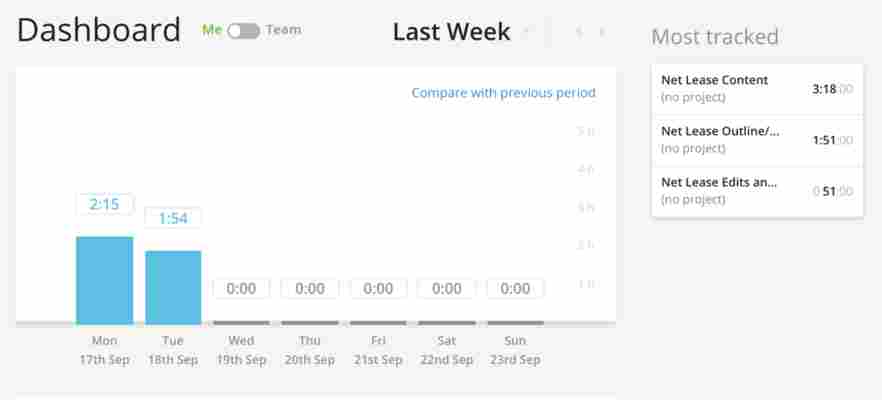Whether you need to keep tabs on clients or get a better sense of how you’re actually using your time, time tracking apps provide a much-needed reality check to workers of all stripes.

Ambitious folks know the importance of managing time–but some of us lack that innate ability to know where our time actually goes. Tracking apps, when used properly, provide insights into how we’re using our time and where we can improve.
But, it’s worth noting that not all time trackers are created equal.
Some come with robust solutions for managing teams remotely. Others focus on keeping managers happy—at the risk of violating the privacy of those who use them. Here are a few of our favorite apps that function as your own personal time clock, no looming boss required.
Best Time Tracking Apps
Toggl (web, iOS, Android)

A popular time-tracking app that supports individuals and teams alike, you can assign different people different hourly rates—if you manage contractors. If you’re an individual, all you’ll need to do is enter the name of your project and start tracking.
The tagging feature comes in handy, especially if you’re dealing with different projects and various sub-tasks. If you’re the forgetful type, you can also add time manually, after the fact.
The basic plan is free and brings enough functionality to the table for individuals, but those working in teams may want to upgrade to the $5 a month Pro Plan or the $49 a month Business plan.

Harvest (web, iOS, Android)
Harvest is a great time tracking option for freelancers, as you can easily track multiple projects at a time, regardless of differences in rates and tasks.
Track billable and non-billable hours to get a sense of what’s sucking up most of your time—and analyze data, submit a timesheet, and send reminders.
We like that Harvest comes with a range of tools designed to track time and submit all of the associated documentation. This tool takes the cake for bringing the most functionality to a digital time clock.
Harvest does come with a relatively hefty price tag—but it integrates with a whole list of productivity tools like Trello, Basecamp, and Zendesk. It’s also a fee-free alternative to PayPal, so if you’re sending invoices, it might be worth the monthly fees.
TopTracker (web, desktop)
TopTracker is one of the better time trackers on the market. This option was built with the freelancers in mind. The app was built by Toptal—the exclusive freelancing website and aims to help you log how you track your time. It’s not built for the people hiring freelancers, and the makers of the app explicitly state that the tool is made for helping users keep track of how much time they’re spending on a project—which should inform how much they’re charging.
It’s completely free—no limitations—and gives the user complete control over the tracking process.
This tool comes with a lot of features, too. You’ll be able to blur screenshots, track based on activity level, and take advantage of timed screenshots.
Clockify (web, iOS, Android)
One of the simplest digital time tracking apps out there—and that’s a good thing. The platform uses a digital stopwatch, making it easy for users to stop and start each task as it begins and ends.
Clockify also allows you to track billable time—so you can easily bill a client. We liked that the platform allows you to use this as a way to stay on task and gauge how much time you’ll need for tasks moving forward,
If you manage employees, you can use this to see where your staff spends the most time—and while this might feel invasive, it could be an effective way to see which customers demand the most attention.
Everhour (web)
Everhour allows you to track time you can bill on an hourly basis. This platform isn’t the most robust solution, but it’s affordable and delightfully basic. Sometimes all we need is a way to make sure we’re staying on task.
It’s not a direct competitor to something like Harvest, but it serves as a way to help you see how long tasks take you to perform—and as such, quote clients more accurately from the outset of a new project.
Final Thoughts
Like any tracking implement, time trackers stand to illuminate those blind spots that are costing you money and time.
They also stand to help you understand how you work and which times are most productive. The more you know, right?
More from Softonic
The best ways to collaborate in Google Docs ►
How to create an easy budget in Google Sheets ►
Tips and tricks for writing a novel in Google Docs ►
Things you didn’t know you could do with Google Drive ►
